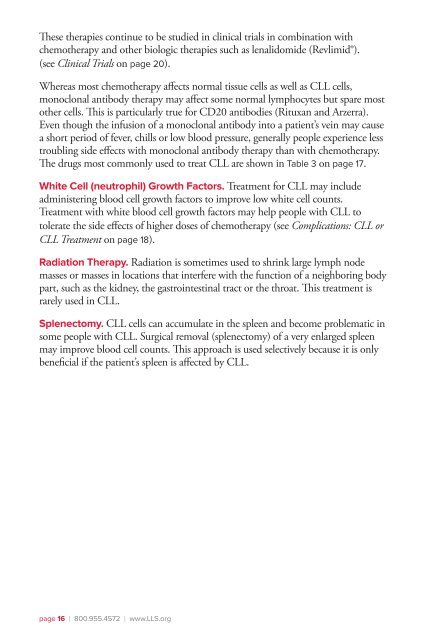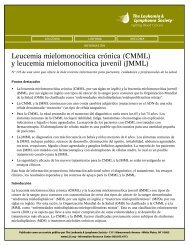Chronic Lymphocytic Leukemia - The Leukemia & Lymphoma Society
Chronic Lymphocytic Leukemia - The Leukemia & Lymphoma Society
Chronic Lymphocytic Leukemia - The Leukemia & Lymphoma Society
Create successful ePaper yourself
Turn your PDF publications into a flip-book with our unique Google optimized e-Paper software.
<strong>The</strong>se therapies continue to be studied in clinical trials in combination with<br />
chemotherapy and other biologic therapies such as lenalidomide (Revlimid®).<br />
(see Clinical Trials on page 20).<br />
Whereas most chemotherapy affects normal tissue cells as well as CLL cells,<br />
monoclonal antibody therapy may affect some normal lymphocytes but spare most<br />
other cells. This is particularly true for CD20 antibodies (Rituxan and Arzerra).<br />
Even though the infusion of a monoclonal antibody into a patient’s vein may cause<br />
a short period of fever, chills or low blood pressure, generally people experience less<br />
troubling side effects with monoclonal antibody therapy than with chemotherapy.<br />
<strong>The</strong> drugs most commonly used to treat CLL are shown in Table 3 on page 17.<br />
White Cell (neutrophil) Growth Factors. Treatment for CLL may include<br />
administering blood cell growth factors to improve low white cell counts.<br />
Treatment with white blood cell growth factors may help people with CLL to<br />
tolerate the side effects of higher doses of chemotherapy (see Complications: CLL or<br />
CLL Treatment on page 18).<br />
Radiation <strong>The</strong>rapy. Radiation is sometimes used to shrink large lymph node<br />
masses or masses in locations that interfere with the function of a neighboring body<br />
part, such as the kidney, the gastrointestinal tract or the throat. This treatment is<br />
rarely used in CLL.<br />
Splenectomy. CLL cells can accumulate in the spleen and become problematic in<br />
some people with CLL. Surgical removal (splenectomy) of a very enlarged spleen<br />
may improve blood cell counts. This approach is used selectively because it is only<br />
beneficial if the patient’s spleen is affected by CLL.<br />
page 16 I 800.955.4572 I www.LLS.org

















